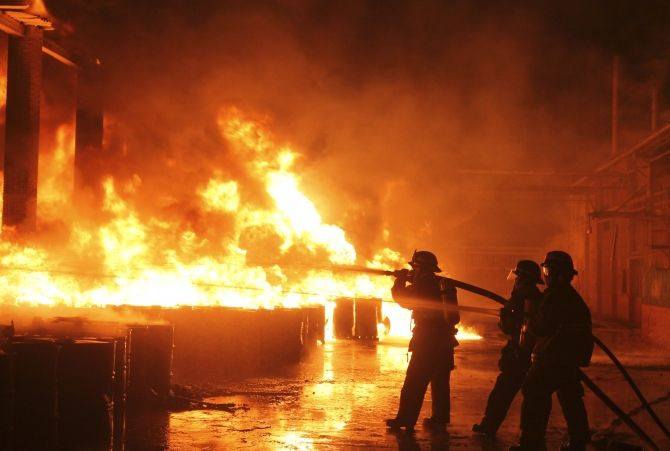The Psychology of Altruism: Is Saving Others' Lives Inherently a Selfish Act?

In the face of tragedy, we always look to heroes. This weekend, during the Wisconsin shooting of the Sikh temple, one of the six deaths was that of the temple president, Santwat Singh Kaleka, who attempted to disarm the shooter. In Aurora, Colorado, three women came forward and said that they had lived because of the heroic actions of their boyfriends, who draped their bodies over them and died as bullets rained down on their bodies. In Italy, a 57-year-old crewmember aboard the Costa Concordia stayed aboard the sinking ship, even as his own captain infamously left the passengers to fend for themselves.
Throughout all of those stories, there were also people who stormed for the exits. What causes people to hit the button on fight or flight?
Though most of these people die in the act of saving others, we love to create heroes – and it is natural for humans to do so. Throughout history, heroes have had a place in mythology in just about every culture. And it is no surprise: altruism was a question that haunted even Charles Darwin. After all, if the survival of a species was dependent on the survival of the fittest, what would allow a person to save another – especially at the expense of his or her own life?
One study published earlier this year postulated that altruism is inherently competitive and egotistical. The study, conducted by Francis McAndrew and Carin Perilloux, surveyed a small sample size of 78 partipants. They asked participants to endure pain, by dunking their hands into a tub of ice water for 40 seconds, or submerging their whole body under ice water. At the end, the participants were asked to divide a $1,170 pot any way the volunteers chose. The investigators found that the participants who endured more pain were judged to be more likeable, and were given significantly more money than the others. The researchers found that that "self-sacrificial behavior" was a strategy that benefited participants in the near-distant future.
While the study was hampered by its small sample size, and the fact that it was not a life or death situation, that likeability may hold a key – or, if not likeability, close personal relationships, to altruism. A 2004 study analyzed the personalities of non-Jewish people who rescued people from Nazis, and other non-Jewish people who did nothing. They found that those who helped were more likely to report risk-tasking behavior, which is unsurprising. But they also found, in an even stronger correlation, that people were more likely to intervene if they interacted with their friends and family on a regular basis.
But is it is important to note that, for many heroes who live, there are monetary benefits. In fact, the Carnegie Fund exists for that very reason. According to their website, in order to be eligible for the award, "[the] candidate for an award must be a civilian who voluntarily risks his or her life to an extraordinary degree while saving or attempting to save the life of another person. The rescuer must have no full measure of responsibility for the safety of the victim. There must be conclusive evidence to support the act's occurrence, and the act must be called to the attention of the Commission within two years."
Most of the people who receive their awards – people who save other people from drowning or from electrocution – are unable to explain what went through their mind before saving another person. Lora Shrake, who scaled an electric fence to save a woman being mauled by a 900-pound bull, said, "I didn't really take the moment to think of what might happen." Bill Pennel, who dove into a burning car to save the passengers, stated, "I did what any normal person might do."
One of the recipients of an award from the Carnegie Fund was Wesley Autry. While his name may not be familiar to you now, in 2007, he was everywhere, even selected as one of TIME's 100 Most Influential People. That year was the year that he left his daughters, then 6 and 4-years-old, on a subway platform to dive in front of a moving train. Lying on the tracks was a man, over 6 feet tall, who had fallen onto the tracks after an epileptic seizure, now unconscious and unable to move. In an interview with Radiolab, Autry recounted the moments before he dove onto the tracks and laid on top of the man in an effort to save his life. He said he heard a voice in his head that said, "I can do this." When asked why, Autry said, "I felt [chosen] for that." He thought back to a memory 20 years prior, when a gun was pressed against his temple and misfired, sparing his life. "I was spared for a reason," he ruminated.
Perhaps that is the answer: these heroes saw themselves as part of something larger than them. While the majority of these people probably never made a conscious choice to save others, they did. Even amoebas have been shown to be capable of that – choosing to die so that the species as a whole can live in times of starvation. And, in the face of their courage and altruism, amoebas – and humans – have lived.
Published by Medicaldaily.com



























